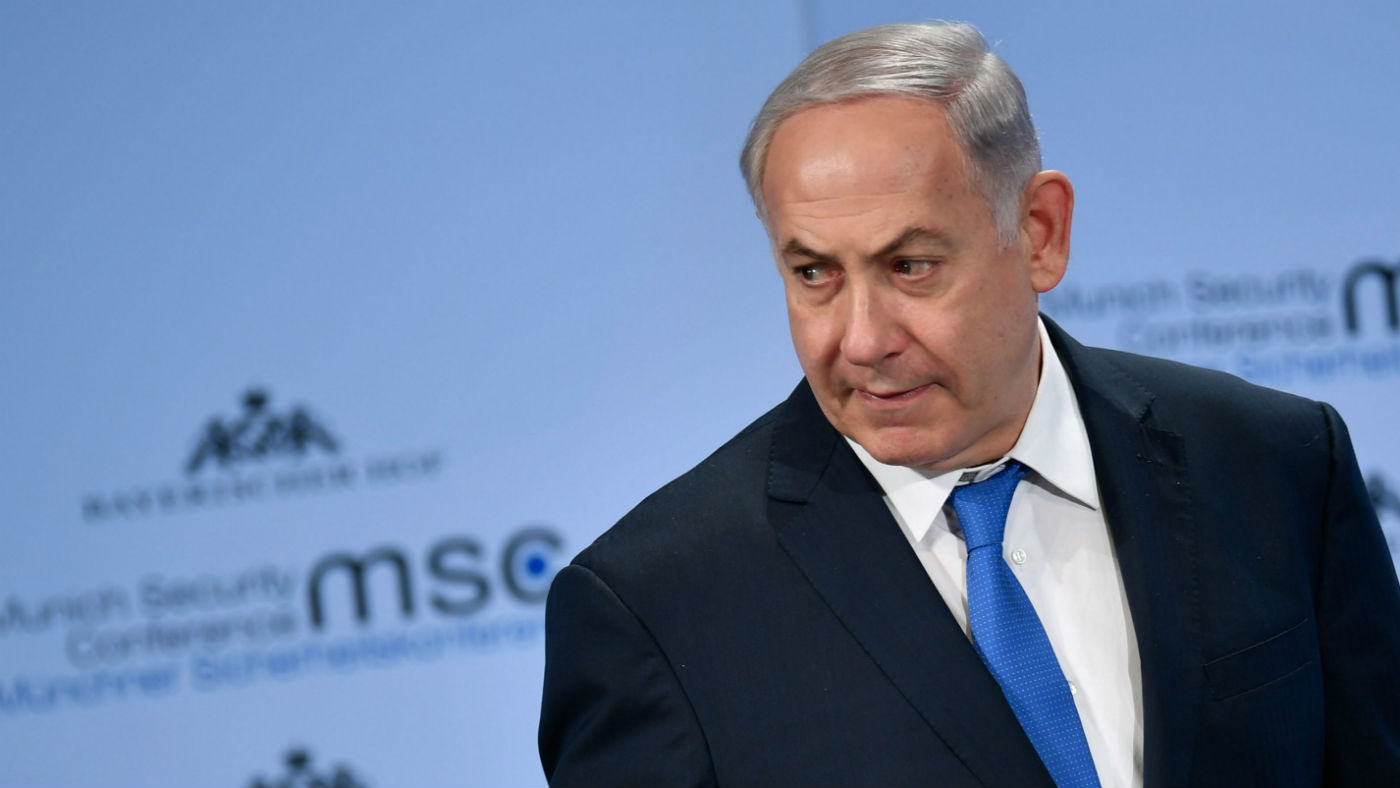Israel threatens direct action against Iran
Benjamin Netanyahu’s heightened rhetoric comes a week after Israel and Iran clashed in Syria

A free daily email with the biggest news stories of the day – and the best features from TheWeek.com
You are now subscribed
Your newsletter sign-up was successful
Israel’s Prime Minister Benjamin Netanyahu has stepped up his war of words with Iran, insisting that his country will act directly against Tehran if necessary.
The threat comes after Israeli attacks on Iranian military targets in Syria last weekend.
Brandishing a charred fragment of what he claimed was a downed Iranian drone, Netanyahu told the Munich security conference: “Israel will not allow the regime to put a noose of terror around our neck.”
The Week
Escape your echo chamber. Get the facts behind the news, plus analysis from multiple perspectives.

Sign up for The Week's Free Newsletters
From our morning news briefing to a weekly Good News Newsletter, get the best of The Week delivered directly to your inbox.
From our morning news briefing to a weekly Good News Newsletter, get the best of The Week delivered directly to your inbox.
“We will act if necessary, not just against Iran’s proxies but against Iran itself,” he said, describing the country as “the greatest threat to our world”.
BBC diplomatic correspondent Jonathan Marcus said the theatricall flourish was “vintage Benjamin Netanyahu, from a Prime Minister embattled at home with potential corruption charges looming over his head”.
Iran’s foreign minister, Mohammad Javad Zarif, called the presentation “a cartoonish circus, which does not even deserve a response”.
Proxy war
A free daily email with the biggest news stories of the day – and the best features from TheWeek.com
Israel “has accused Tehran of seeking a permanent military foothold in Syria”, where Iranian-backed forces support Syrian President Bashar al-Assad in civil war entering its eighth year, says Reuters.
There are also concerns within Israel about the situation in Lebanon, where the Iranian-backed Hezbollah is part of a coalition government.
The Guardian says that “as Iran’s military role expands in Syria and Yemen and Donald Trump pushes for a more confrontational approach toward Tehran, Israel is seeking wider support for efforts to contain its regional arch-enemy”.
Iran’s growing influence across the whole of the Middle East region has prompted Israel to align more closely with Sunni Arab states, which share worries about their Shi’ite rival.
-
 What are the best investments for beginners?
What are the best investments for beginners?The Explainer Stocks and ETFs and bonds, oh my
-
 What to know before filing your own taxes for the first time
What to know before filing your own taxes for the first timethe explainer Tackle this financial milestone with confidence
-
 The biggest box office flops of the 21st century
The biggest box office flops of the 21st centuryin depth Unnecessary remakes and turgid, expensive CGI-fests highlight this list of these most notorious box-office losers
-
 Epstein files topple law CEO, roil UK government
Epstein files topple law CEO, roil UK governmentSpeed Read Peter Mandelson, Britain’s former ambassador to the US, is caught up in the scandal
-
 Iran and US prepare to meet after skirmishes
Iran and US prepare to meet after skirmishesSpeed Read The incident comes amid heightened tensions in the Middle East
-
 Which way will Trump go on Iran?
Which way will Trump go on Iran?Today’s Big Question Diplomatic talks set to be held in Turkey on Friday, but failure to reach an agreement could have ‘terrible’ global ramifications
-
 Syria’s Kurds: abandoned by their US ally
Syria’s Kurds: abandoned by their US allyTalking Point Ahmed al-Sharaa’s lightning offensive against Syrian Kurdistan belies his promise to respect the country’s ethnic minorities
-
 Israel retrieves final hostage’s body from Gaza
Israel retrieves final hostage’s body from GazaSpeed Read The 24-year-old police officer was killed during the initial Hamas attack
-
 China’s Xi targets top general in growing purge
China’s Xi targets top general in growing purgeSpeed Read Zhang Youxia is being investigated over ‘grave violations’ of the law
-
 Syria’s Islamic State problem
Syria’s Islamic State problemIn The Spotlight Fragile security in prison camps leads to escape of IS fighters
-
 Panama and Canada are negotiating over a crucial copper mine
Panama and Canada are negotiating over a crucial copper mineIn the Spotlight Panama is set to make a final decision on the mine this summer